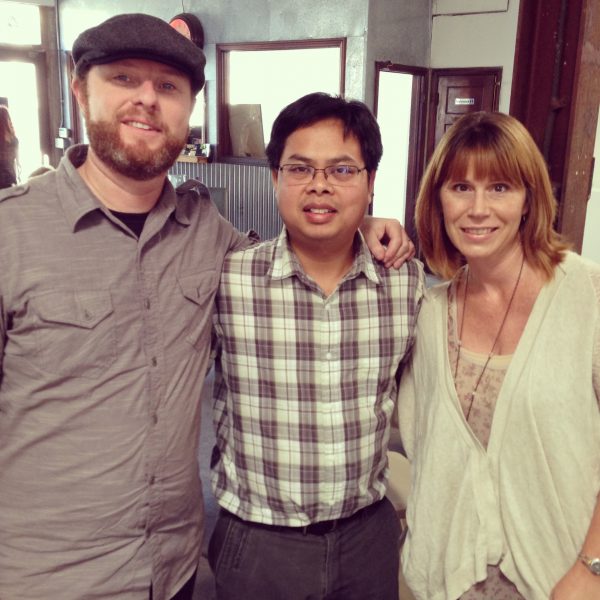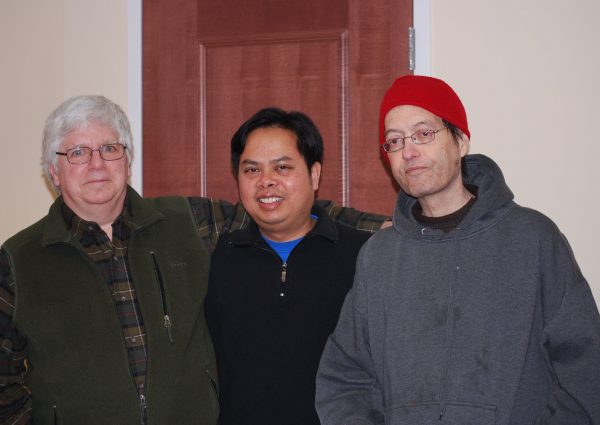For Nick
He sits in my office, eyes scanning the books on my shelves. I bring up the topic of friends and the importance of having a community of one’s own. He tells me, “Writing is the loneliest of activities. No one understands what I go through.”
I can tell already that he is a writer’s writer. Like me, he didn’t come to his love of literature from finding escape in Tolkien’s The Lord of the Rings trilogy or Rowling’s Harry Potter series. He didn’t grow up devouring King’s The Dark Towers trilogy or Gaiman’s The Sandman graphical novels. He was awakened by James Joyce, specifically where arts and literature become a kind of a religious experience in Portrait of The Artist as a Young Man. From there he turned to the States and got hooked on Ginsberg, Kerouac, and Corso. He’s telling me he’s now reading Henry Miller, that madman who finds cosmic truths in desire, sex, and lust.
I want to tell him to be like Miller and return to Europe, where he will find Baudelaire and Rimbaud. Go past Sartre, but stay with de Beauvoir and Camus. Then go further east: Tolstoy is fine, but pay attention to Chekhov and Dostoevsky.
Instead, I return to the original topic and tell him about my literary friends.
In the fall of 2013, I gave a reading at the Long Beach Poetry Festival. After my reading, a guy came up to me and said, in his thick New York accent, that he really enjoyed my work. I said, “Thanks. Do you also write?”
He smiled, “I’m Tony Gloeggler. I read later this afternoon. Hope you stick around.”
I went out for lunch with an old college buddy, returned to the venue an hour later, and stuck around until five in the afternoon, when Tony, in his button-down shirt and Yankees hat, walked up to the podium. He didn’t introduce his poems. He simply read. The poems were honest, heartfelt, and real, as if Tony had been carrying these experiences with him for years until they were crystallized into poetry. I went up to him afterward, asked him to sign his book, The Last Lie, and said, “Thanks for sharing your poetry. It takes courage to tell those stories.”

The next morning, I flew back to Upstate New York, taught classes, and graded student papers. Later that week, I received an email from an editor of NYQ Books, who said that he heard about me from one of his poets, Tony Gloeggler, and now wanted to know if I could submit some poems to New York Quarterly. I sent him a selection from my unpublished manuscript. He liked what he read and asked for more. I sent him the entire manuscript and, a few weeks later, he said he would like to publish it.
But this isn’t the entire story of how I became a published poet.
One of the poetry festival organizers, Clint Margrave, was an old college friend from Cal State Long Beach. Back then, we were like my student: young, full of crazy ideas, and wanted to take over the world with our writing. We detested the pomposity of Sartre but admired the courage and tenacity of Camus. We loved the madness of Baudelaire. When Clint saw an essay of mine on Charles Bukowski, the godfather of Long Beach poetry, published on the online literary magazine Numéro Cinq in early 2013, he sent a quick email asking if I would like to participate in the festival. “No financial compensation,” he warned me. “That’s fine,” I wrote back. “It would do me good to be back to the old stomping ground.”
And, of course, it was Jordan Smith, an established poet and friend at the college where I teach, who read the Bukowski essay, saw something good and worthwhile in it, and encouraged me to submit, suggesting Numéro Cinq as a possible home for the essay. Jordan, to this day, continues to support and encourage, sharing his work with me, putting poetry books in my campus mailbox, and creating mix CDs of Jazz because I told him I liked the music he shared on Facebook.
[alert type=alert-white ]Please consider making a tax-deductible donation now so we can keep publishing strong creative voices.[/alert]
I’ve been lucky when it comes to having good friends in my life. This is coming from a guy who is shy and quiet, uncomfortable in social situations, and prefers to be home reading a book or watching a movie than to go out on a Friday night. I’m still not sure how I have managed to meet people, build and sustain relationships with them, and have them consider me as their friend.
But friends aren’t just about being invited to a festival or having a book published. Friends are necessary in maintaining one’s sanity and survival in the writing world. My student is correct when he said, “Writing is the loneliest of activities.” I don’t just mean the rituals of writing—i.e. sitting down in front of a computer screen, alone with one’s thoughts and feelings, choosing carefully the right words in the right order, to make these thoughts and feelings translatable and relatable to readers.
In the world of literary rejections, one needs friends like a fish needs water. No matter how confident we think we are or how desensitized we have told ourselves, rejections hurt. If Zadie Smith is correct when she says that our writing is our best self, then to have that best self dismissed, there isn’t much hope in any thing afterward. There’s only depression, sadness, and doubt.
Family and friends don’t understand why we dedicate much time and energy to the writing craft. Some will not even bother reading our work. So we turn to our writer friends. After a series of rejections, I email Clint and Tony. It might be the fourth or tenth rejection, from the editor of a prestigious journal or of a magazine that I thought was a sure thing. Maybe after reading a newspaper article about Southeast Asian American poetry where the author doesn’t mention my work, I’d shoot an email to my friends. I’m one of the few Cambodian American writers working in contemporary poetry, I complain to them. They do the same after waiting for six months to a year only to receive a curt depersonalized rejection notice. We then begin to wonder about our poetic style: clear, direct, and honest. We are storytellers and confessional poets. Maybe this kind of poetry isn’t as valued as the more abstract, experimental, language kind of poetry. Then, as quickly as this thought enters the conversation, we instinctively defend our style. We console and protect each other. We tell each other that this is who we are. We can’t write in any other style. It would be “inauthentic,” one of us would say.

If I feel that I bother these guys too much, I write to other poet friends: Jordan Smith, a master of craft and technique and, equally important, a ferocious reader; Alan Catlin, the co-founder of Misfit Magazine, the poet of a thousand voices and styles; Ted Jonathan, a fellow NYQ poet who gets my back no matter what; Alexis Rhone Fancher, the poet who writes courageously about power and sexuality, the street photographer who captures urban life in Southern California, an unflinching lover and supporter of the arts.
Afterward, I am full of hope. I return to the writing board, do diligent work in the light and goodness of these dear friends, and begin submitting again. I am less alone.
Featured photo provided by Alexis Rhone Fancher.
